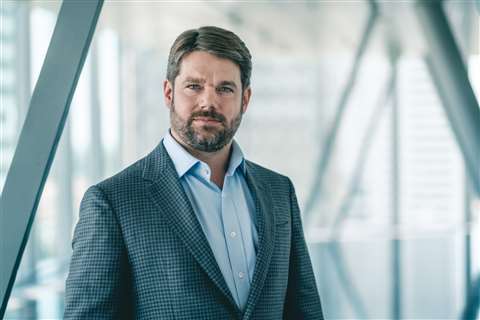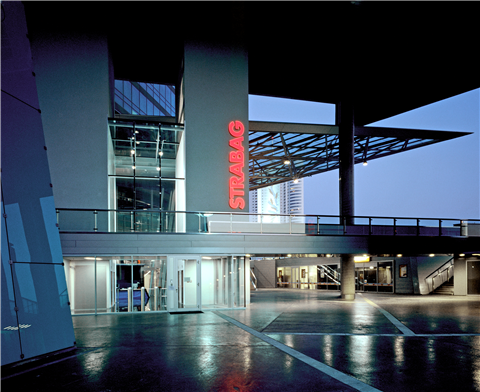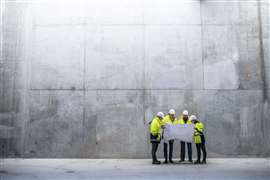Why megaprojects alone can’t sustain an expanding contractor
04 May 2023
 Finishers worked with data based on the single digital BIM model
Finishers worked with data based on the single digital BIM model
Major contractors exploring new markets will need more than megaprojects alone to succeed.
That’s the view of Klemens Haselsteiner, the CEO of Austrian contracting giant Strabag, which last week unveiled what it claimed was its second-best financial performance in its history.
Strabag’s revenue hit a record level of €17.7 billion (US$19.5 billion) in 2022, up 10% on the previous year. Its earnings before interest, taxation, depreciation and amortisation (EBITDA) were €1.26 billion ($1.4 billion), down 13%. EBIT margin was 4.2% for the year.
It marks the fourth year in a row that Strabag has recorded EBITDA of over €1 billion ($1.1 billion). The infrastructure firm’s performance helped it to dislodge Skanska from fifth place among Construction Europe’s list of the biggest contractors in 2021.
Part of that success has come from growth beyond Strabag’s core markets of Austria, Germany and the Czech Republic.
Strabag is currently working as part of a consortium with Skanska and Costain on the main work civils contract packages for the HS2 high-speed rail megaproject in the UK, which ranks among Europe’s biggest construction projects.
 Klemens Haselsteiner
Klemens Haselsteiner
But Haselsteiner told International Construction that while Strabag is interested in expanding further in markets such as the UK, as well as countries including Canada, Chile and Colombia, it cannot do so solely off the back of megaprojects in those regions, however attractive they may be.
Haselsteiner said, “We can only be successful in the long term and sustainably on international markets if we operate a regional business there.
“We are talking about bread and butter business in the form of small and mid-sized projects.
“The disadvantage of large or megaprojects is, that they are very cyclical.”
He warned that contractors who found themselves finishing a mega project without a stable base of other, smaller projects in a new market risked losing both know-how and good people.
“Therefore, in the first step of our expansion, we are concentrating on the markets in which we are already active: UK, Canada, Chile or Columbia,” he added.
Record order book
Strabag grew its order book to a record €23.7 billion ($26.1 billion) at the end of 2022, up 6% on the prior year.
Meanwhile, 21% of its revenue now comes from its international and special divisions, with 47% from its north and west operating segment (covering Germany, Poland, the Benelux countries and Scandinavia), and 32% from the south and east (covering Austria, Switzerland, Hungary, the Czech Republic, Slovakia and until recently Russia).
Despite the fact that profit fell during 2022, Strabag said it expected a “normalisation” following a year of “exceptionally high” earnings before interest and taxation (EBIT) in the previous year.
EBIT margin in 2022 was 4.2%, down from 5.9%, which is in line with the group’s goal of achieving at least 4% on a sustainable basis from 2022.
Skills challenge
Aside from the challenge of inflation brought about in part by the Ukraine war, Haselsteiner noted that the business faces a significant challenge when it comes to skilled workers.
 Photo: Strabag.
Photo: Strabag.
The business is currently looking to recruit nearly 4,000 people in Europe, on top of its 11,600-strong workforce in Austria, but only managed a slim improvement in numbers over the past year.
Haselsteiner, who himself started working for the company within its Russian division in 2011 and joined the management board in 2020, stressed the need for the company to engage with educational institutions and young people to bring in the talent the business needs as it grows.
He said, “We have 11,600 employees in Austria. This is a small increase of one percent, so despite the problems already mentioned, we are able to hire or find new workers and experts.
“However, we still have 3,700 vacancies throughout the group, 450 of them in Austria and 2,500 in Germany, and that is why it is still very important that we as Strabag continue and intensify our cooperation with universities, but also that we continue to invest in the training of our own specialists, which we have already done with our campus in Ybbs.”
Strabag opened its Ybbs training centre, which trains 250 apprentices each year, in 2021.
The facility cost €10 million ($11 million) to set up. Every apprentice in the business spend around four weeks at the campus, undergoing vocational training including practice handling tools, familiarisation with construction site work, and using simulators to learn how to operation construction machinery.
‘No influence’ from Russian shareholders
Meanwhile, Haselsteiner batted away any questions about Russian oligarch Oleg Deripaska’s involvement in the business.
Deripaska, who has been sanctioned by the European Union, UK and USA, controls shareholder Rasperia, which had a 27.8% stake in the contractor. Following the invasion of Ukraine by Russia last year, Strabag announced that it was terminating its agreement with those shareholders as well as its operations in the country.
Speaking again about the situation last week, Haselsteiner said, “Following Russia’s invasion of Ukraine, we quickly and decisively implemented sweeping measures to prevent any possible, even indirect, influence on Strabag by Oleg Deripaska.”
STAY CONNECTED



Receive the information you need when you need it through our world-leading magazines, newsletters and daily briefings.
CONNECT WITH THE TEAM











